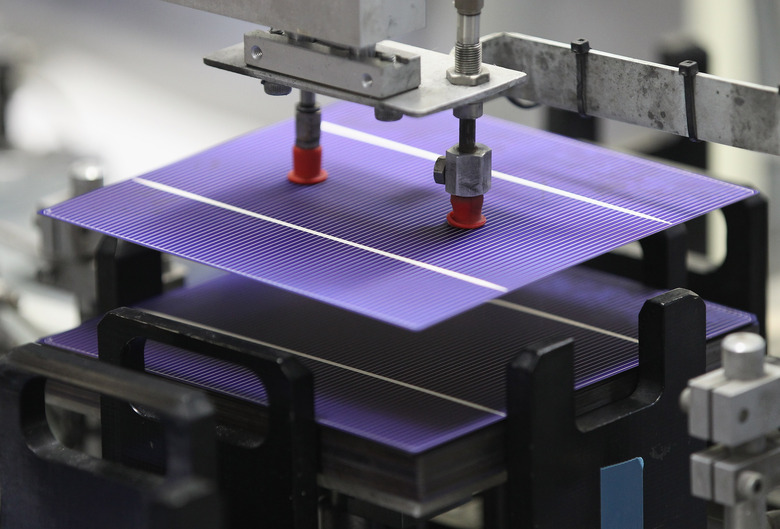How Does Temperature Affect Solar Panels?
Photovoltaic solar cells are semiconductor materials engineered to convert sunlight to electricity. You can think of a semiconductor as an empty shelf above a bin full of bouncy balls — where the balls are like electrons in a semiconductor. The balls in the bin below can't move very far, so the material conducts poorly. But if a ball jumps up to the shelf, it can roll very easily, so the material turns into a good conductor. When sunlight comes into a semiconductor, it can lift a ball out of the bin and put it onto the shelf. You'd think the more sunlight, the better — more balls put onto the shelf, more current from the solar cell. But more sunlight can also mean higher temperatures — and higher temperatures generally reduce the power out of a solar cell.
Semiconductors
Semiconductors
When sunlight comes into a solar cell, it adds energy to electrons, but those energetic electrons don't do anybody any good in the solar cell — they have to get out. So solar cells are engineered so that shelf is at an angle. A ball on the shelf quickly rolls down. If you build a tube from the low edge of the shelf winding around to the bin below, then the balls will flow down out of the solar cell and back. That's more or less what happens when electrical wires are hooked up to a solar cell — electrons are picked up by sunlight and pushed into a circuit.
Power From a Solar Cell
Power From a Solar Cell
In electrical terms, power is voltage times current. Current refers to the number of electrons being pushed out of the solar cell, and voltage refers to the "push" that each electron gets. Thinking back to the bin and the shelf, current is the number of balls put onto the shelf each second and voltage is how high the shelf is.
When the sun gets brighter. it gives energy to more electrons — lifts more balls onto the shelf — but the shelf doesn't get any higher. That is, the voltage out of a solar cell depends on how the solar cell is built, while the maximum current depends on how much sunlight it absorbs. The voltage and current also depend upon some other factors. One of those is temperature.
Temperature Effects
Temperature Effects
Temperature measures how much things are moving around. In the case of a semiconductor, temperature measures how much the electrons are moving around and how much the holders for those electrons are moving around. Again thinking of the shelf and the bin of balls, when a semiconductor is hotter, it's as if the balls are churning and bouncing around in the bin and the shelf above is vibrating up and down.
In a hot solar cell, the balls are already bouncing around a bit, it's easier for sunlight to pick them up and put them on the shelf. Because the shelf is vibrating up and down, it's also easier for the balls to get onto the shelf, but because they aren't as high, they don't roll as fast. That is, when a silicon solar cell gets hotter, it generates more current but less voltage. Unfortunately, it's just a little more current and a lot less voltage, so the result is that the power decreases.
Solar Panel Output
Solar Panel Output
Solar panels are built from a whole bunch of solar cells wired together. Different manufacturers build their panels differently, so you might find one solar panel with 38 cells and another with 480 cells. Even with differences in silicon solar panel manufacturing, the material is more or less the same, so the temperature effects are also almost identical. Typically, silicon solar cell power output drops about 0.4 percent with every degree Celsius (1.8 degrees Fahrenheit).
The temperature refers to the actual material temperature, and not the air temperature, so on a sunny day it's not that unusual for a solar panel to reach 45 degrees C (113 degrees F). That means a panel rated for 200 watts at 20 degrees C (68 degrees F) will only put out 180 watts.
Cite This Article
MLA
Gaughan, Richard. "How Does Temperature Affect Solar Panels?" sciencing.com, https://www.sciencing.com/temperature-affect-solar-panels-20687/. 24 April 2017.
APA
Gaughan, Richard. (2017, April 24). How Does Temperature Affect Solar Panels?. sciencing.com. Retrieved from https://www.sciencing.com/temperature-affect-solar-panels-20687/
Chicago
Gaughan, Richard. How Does Temperature Affect Solar Panels? last modified March 24, 2022. https://www.sciencing.com/temperature-affect-solar-panels-20687/
